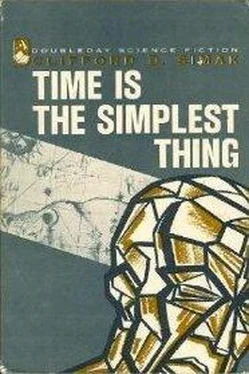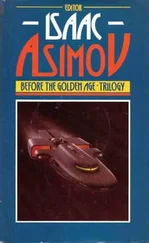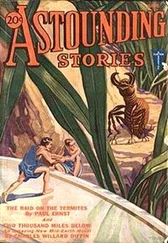Blaine slid into the car and sank into the seat. The door hissed shut, and Freddy swung the car into a traffic lane.
“I told Charline,” said Freddy, settling down to chatter, “that a party simply could not be a party without a soul from Fishhook. I volunteered to go out and snare a Fishhook personage.”
“You goofed,” Blaine told him shortly. “I am no personage.”
“Except,” said Freddy, “you travelers have such horrendous tales to tell.”
“You know,” said Blaine, “that we never tell them.”
Freddy clicked his tongue. “Secrecy,” he said.
“You’re wrong,” said Blaine. “It’s rules and regulations.”
“Of course. And that’s the reason rumor is a rampant wildfire in this town. Let something happen in the afternoon up here on the hill and by evening it is being told in the finest detail in the lowest dives.”
“But usually not correct.”
“Perhaps not in its more lurid and exact description, but at least in principle.”
Blaine did not answer. He settled back in the seat and turned his head toward the window, watching the lighted streets slide past and above the streets the massive, terraced blocks of buildings that were Fishhook. And marveled at the unfailing wonder of this sight which after all the years never failed to thrill him. Knowing as he thought it that it was not the sight itself, for there were grander in the world, but the fabulous significance which fell like a mantle on the city.
For here, he thought, in fact, if not in name, was the capital of Earth. Here lay the hope and greatness of the future, here was the human link with other worlds deep in outer space.
And he was leaving it.
Incredible as it seemed, with all his love of it and all his devotion to it and all his faith in it, he was running from it like a frightened rabbit.
“What are you guys going to do with all of it?” asked Freddy.
“All of what?”
“All the knowledge, all the secrets, all the concepts that you are raking in.”
“I wouldn’t know,” said Blaine.
“Regiments of scientists,” said Freddy, “working happily away. Corps of technologists doping out new angles. How far ahead of the rest of us are you — a million years or so?”
“You’re talking to the wrong man,” said Blaine. “I don’t know a thing. I just do my job. And if you’re needling me, you should know that I don’t needle.”
“I’m sorry,” said Freddy. “It’s an obsession with me.”
“You and a million other people. Bitching at Fishhook is a worldwide pastime.”
“Look at it my way,” said Freddy, earnestly. “I’m sitting on the outside. I’m not even looking in. Here I see this great monstrosity, this human paragon, this superhuman project, and I feel an envy of everyone who’s in it and a sense of not belonging and distinctly second-rate. Do you wonder the world hates Fishhook’s guts?”
“Do they?”
“Shep,” said Freddy, solemnly, “you should get around.”
“No particular need. I hear enough of it without going anywhere. My question was: Do they hate Fishhook really?”
“I think they do,” said Freddy. “Maybe not right here. All the talk in this town is mostly fashionable. But get out in the provinces. They really hate it there.”
The streets now were not so closely hemmed nor the lights so bright. There were fewer business places and the residences were thinning out. The traffic had diminished.
“Who’ll be at Charline’s?” asked Blaine.
“Oh, the usual crowd,” said Freddy. “Plus the usual zoo. She’s the crazy sort. Without any inhibitions, scarcely with a social sense. You might bump into almost anyone.”
“Yes, I know,” said Blaine.
The thing stirred inside his brain, almost a sleepy stir.
It’s all right, Blaine told it. Just settle down and snooze. We have got it made. We are on our way.
Freddy swung the car off the main road and followed a secondary that went winding up a canyon. The air took on a chill. In the dark outside one could hear the trees talking back and forth and there was the smell of pine.
The car turned an abrupt curve, and the house was shining on a bench above — a modernistic cliff dwelling plastered in the canyon’s wall like a swallow’s nest.
“Well,” said Freddy, joyously, “here we finally are.”
The party was beginning to get noisy — not boisterous, but noisy. It was beginning to acquire that stale air of futility to which, in the end, all parties must fall victim. And there was something about it — about the sour smell of too many cigarettes, the chill of the canyon breeze through the open windows, the shrill and vacant sound of human chatter — that said it was getting late — late and time to go, although it really wasn’t. It wasn’t midnight yet.
The man named Herman Dalton stretched his long legs out, slumping in the chair, the big cigar thrust into one corner of his mouth, and his hair like a new-built brush pile from his running hands through it.
“But I tell you, Blaine,” he rumbled, “there’s got to be an end to it. The time will come, if something isn’t done, when there’ll be no such thing as business. Fishhook, even now, has driven us flat against the wall.”
“Mr. Dalton,” Blaine told him wearily, “if you must argue this, you should find someone else. I know nothing about business and even less of Fishhook despite the fact I work there.”
“Fishhook’s absorbing us,” said Dalton, angrily. “They’re taking away our very livelihood. They’re destroying a fine system of conventions and of ethics built very painfully through the centuries by men deeply dedicated to the public service. They are breaking down the commercial structure which has been built so carefully. They’re ruining us, slowly and inexorably, not all of us at once, but surely, one by one. There is the matter, for example, of this so-called butcher vegetable. You plant a row of seeds, then later you go out and dig up the plants as you would potatoes, but rather than potatoes you have hunks of protein.”
“And so,” said Blaine, “for the first time in their lives, millions of people are eating meat they couldn’t buy before, that your fine, brave system of conventions and of ethics didn’t allow them to earn enough to buy.”
“But the farmers!” Dalton yelled. “And the meat market operators. Not to mention the packing interests . . .”
“I suppose,” suggested Blaine, “it would have been more cricket if the seeds had been sold exclusively to the farmers or the supermarkets. Or if they were sold at the rate of a dollar or a dollar and a half apiece instead of ten cents a packet. That way we’d keep natural meat competitive and the economy safe and sound. Of course, then, these millions of people—”
“But you do not understand,” protested Dalton. “Business is the very lifeblood of our society. Destroy it and you destroy Man himself.”
“I doubt that very much,” said Blaine.
“But history proves the position of commercialism. It has built the world as it stands today. It opened up the new lands, it sent out the pioneers, it erected the factories and it—”
“I take it, Mr. Dalton, you read a lot of history.”
“Yes, Mr. Blaine, I do. I am particularly fond of—”
“Then, perhaps, you’ve noticed one other thing as well. Ideas and institutions and beliefs in time outlive their usefulness. You’ll find it in page after page of all our history — the world evolves and the people and their methods change. Has it ever occurred to you that business as you think of it may have outlived its usefulness? Business has made its contribution and the world moves on. Business is just another dodo. . . .”
Читать дальше








